Ametropia - Study guides, Class notes & Summaries
Looking for the best study guides, study notes and summaries about Ametropia? On this page you'll find 156 study documents about Ametropia.
Page 3 out of 156 results
Sort by
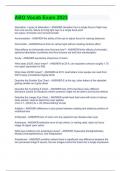
-
ABO Vocab Exam 2023
- Exam (elaborations) • 8 pages • 2023
- Available in package deal
-
- $10.49
- + learn more
Aberration + types of abberation - ANSWER-deviation from a single focus of light rays from one source; failure to bring light rays to a single focal point two types: chromatic and monochromatic Accomodation - ANSWER-the ability of the eye to adjust focus for varying distances Achromatic - ANSWER-lens that can refract light without creating rainbow effect What effects do Achromatic lens limit and how? - ANSWER-limits effects of chromatic, spherical aberration (combines and thus focuses ...
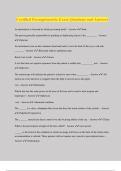
-
Certified Paraoptometric Exam Questions and Answers
- Exam (elaborations) • 14 pages • 2024
- Available in package deal
-
- $12.49
- + learn more
Certified Paraoptometric Exam Questions and Answers An optometrist is licensed by which governing body? - Answer ️️ -State The person generally responsible for grinding or duplicating lenses is the ________. - Answer ️️ -Optician An instrument worn on the examiners head and used to view the back of the eye is call a/an _______. - Answer ️️ -Binocular indirect opthalmoscope Kerat (root word) - Answer ️️ -Cornea A test that does not require responses from the patient is call...
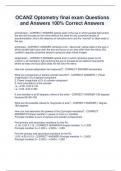
-
OCANZ Optometry final exam Questions and Answers 100% Correct Answers
- Exam (elaborations) • 16 pages • 2024
-
- $14.99
- + learn more
OCANZ Optometry final exam Questions and Answers 100% Correct Answers emmetropia - CORRECT ANSWER-optical state of the eye in which parallel light enters the eye and focuses on the retina without the need for any corrective lenses or accommodation; this is the absence of refractive error and the "normal" or ideal state of the eye ametropia - CORRECT ANSWER-refractive error, "abnormal" optical state of the eye in which parallel light rays enter the eye and focus on an area other t...
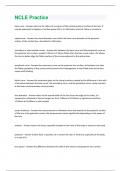
-
NCLE Practice Questions And Answers Rated A+ New Update Assured Satisfaction
- Exam (elaborations) • 13 pages • 2024
-
- $8.49
- + learn more
base curve - Answer-refers to the radius of curvature of the central posterior surface of the lens. It may be expressed in diopters of surface power (D) or in millimeters (mm) of radius or curvature. optical zone - Answer-the chord diameter over which the base curve extends on the posterior surface of the contact lens, described in millimeters secondary or intermediate curves - Answer-lies between the base curve and the peripheral curve on the posterior lens surface, usually 0.70mm to 1.50m...
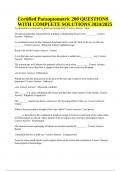
-
Certified Paraoptometric Test QUESTIONS WITH COMPLETE SOLUTIONS 2024/2025 | 100% Verified | Graded.
- Exam (elaborations) • 13 pages • 2024
-
- $14.99
- + learn more
Certified Paraoptometric Test QUESTIONS WITH COMPLETE SOLUTIONS 2024/2025 | 100% Verified | Graded. The person generally responsible for grinding or duplicating lenses is the ________. Correct Answer: Optician An instrument worn on the examiners head and used to view the back of the eye is call a/an _______. Correct Answer: Binocular indirect opthalmoscope Kerat (root word) Correct Answer: Cornea A test that does not require responses from the patient is called a/an __________ test. Correct...
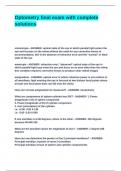
-
Optometry final exam with complete solutions
- Exam (elaborations) • 18 pages • 2024
-
- $10.49
- + learn more
emmetropia optical state of the eye in which parallel light enters the eye and focuses on the retina without the need for any corrective lenses or accommodation; this is the absence of refractive error and the "normal" or ideal state of the eye ametropia refractive error, "abnormal" optical state of the eye in which parallel light rays enter the eye and focus on an area other than the retina; this condition requires corrective lenses to produce clear retinal images astigmatis...
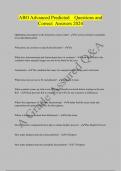
-
ABO Advanced Predicted Questions and Correct Answers 2024
- Exam (elaborations) • 27 pages • 2024
-
- $8.49
- + learn more
Ophthalmic prescription is the formula to correct what? - To correct refractive anomalies in an individual patient With prism, do you have to specify the direction? - Yes What does Anisometropia and Antimetropia have in common? - Both may result in the condition where unequal images are sent to the brain by the eyes. Aniseikonia - The condition that cause two unequal images being sent to the brain What lenses do you use to fix Aniseikonia? - Iseikonic Lenses When a patient comes up with...
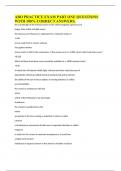
-
ABO PRACTICE EXAM PART ONE QUESTIONS WITH 100% CORRECT ANSWERS. Graded A+
- Exam (elaborations) • 2 pages • 2024
-
- $9.99
- + learn more
ABO PRACTICE EXAM PART ONE QUESTIONS WITH 100% CORRECT ANSWERS. the wavelength of the infrared waves in the electromagnetic spectrum are longer than visible red light waves the Geneva Lens Measure is calibrated for a refractive index of 1.530 A lens made from 2 convex surfaces has against motion A lens reads +4.25D in the vertometer. If the ocular curve is -4.00D, what is the front base curve? +8.25D Which of these front base curves would be suitable for a -300D meniscus lens? +4.50 A...
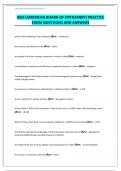
-
ABO (AMERICAN BOARD OF OPTICIANRY) PRACTICE EXAM QUESTIONS AND ANSWERS
- Exam (elaborations) • 2 pages • 2024
- Available in package deal
-
- $5.49
- + learn more
ABO (AMERICAN BOARD OF OPTICIANRY) PRACTICE EXAM QUESTIONS AND ANSWERS which of the following is not ametropia (Ans: - strabismus the macula is positioned on the (Ans: - retina an opacity in the lens causing a reduction in vision is called (Ans: - cataract a simultaneous movement of both eyes in opposite directions is called (Ans: - vergence
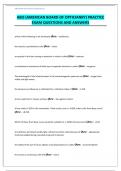
-
ABO (AMERICAN BOARD OF OPTICIANRY) PRACTICE EXAM QUESTIONS AND ANSWERS
- Exam (elaborations) • 2 pages • 2024
- Available in package deal
-
- $5.49
- + learn more
ABO (AMERICAN BOARD OF OPTICIANRY) PRACTICE EXAM QUESTIONS AND ANSWERS which of the following is not ametropia (Ans: - strabismus the macula is positioned on the (Ans: - retina an opacity in the lens causing a reduction in vision is called (Ans: - cataract a simultaneous movement of both eyes in opposite directions is called (Ans: - vergence

How much did you already spend on Stuvia? Imagine there are plenty more of you out there paying for study notes, but this time YOU are the seller. Ka-ching! Discover all about earning on Stuvia


